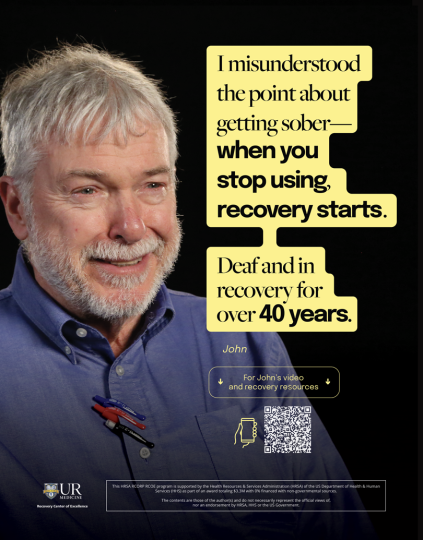- [Interpreter]
My name is John. This is my name sign. My recovery started with my first wife. She forced it on me.
She said, "You have a problem, get help or we're getting a divorce." At the time, I didn't think I had a problem. I drank, I got drunk, I'd pass out. Where's the problem in that?
I started going forward, but it didn't work. After that is when it really became more of a problem. Before, I was drinking every once in a while, it wasn't every day. Afterwards, something clicked, and it went on to ruin my drinking, basically.
I misunderstood the point about getting sober. Initially I thought it was just about stopping my drinking and that was it. But no, when you stop drinking is where you start. When talking about my addiction in terms such as alcoholic, substance abuse or addict, I prefer addict, because for me, there was more than one substance.
Alcohol was my substance of choice, but there were several other substances as well, so I would say 'Addict.' Was I concerned about the stigma and did it make me worry about going for recovery? By the time I went for recovery, I knew I had no choice. I had three options: it was recovery, die, jail, or go crazy.
So, four. Out of those four options, it was clear which choice I wanted. How would I suggest a provider deliver care to addicts? I think it is important to keep a clear distinction between the person and the disease.
When I moved to Rochester, and anytime I moved to a different place, I always sit down with my doctor and explain my health history so they don't prescribe me anything they shouldn't. A common phrase from providers that I've seen today is "Alcoholic in remission," which always makes me laugh. I really like that term. I'm not recovered, but my alcoholism is put on pause.
As long as I do the right things, I'll be okay. So I think that is an important thing to keep in mind. Right now you have a problem, not you are the problem. People in rural areas have a hard time finding support, services, and resources.
Population clusters tend to find things easier. It's harder for people who are more spread out. Part of that is economic. Part of that is in the numbers, I think.
But again, I grew up in a small town and I was the only deaf person. I found out a while later that there was another deaf person, but I never knew. In bigger cities, you can meet so many people, but in the rural areas you really don't. What is the most important point in the recovery process?
Wow. Like I said, to stop using. But to clarify, I mostly speak about alcohol, but there are a lot of different drugs that I've done. Anything I could get my hands on, I would.
For me, the recovery process began...
I mean, really began when I realized that drinking isn't the problem. There was something going on internally that was the problem. If I could get alcohol outta the way, then I could begin to work on myself and figure out what was happening. That's the biggest thing, I think.
Is that learning, first of all, change is possible. Second is that I have to change myself. Yes, I can get guidance and help, but others can't make that change for me. There's plenty of support if you look for it.
Those would be my three things. What should doctors and medical professionals avoid when working with someone with substance abuse issues? Try to avoid that feeling of quote, unquote, looking down at that person. That would be the most important thing.
People can pick up on that even if you think you're being subtle or if you're doing a good job of fighting it. They can feel that shift in attitude and be turned off by it. Compassion is not always easy to find, but find what you have, show it and use it. I wouldn't say, "Oh, you poor thing," that's over the top, but see us as people, tell us, "You have a problem right now that I don't have.
What can I do to help?" I think that's the kind of place that it should be coming from, but I would avoid looking down upon someone and dismissing us. How can hospitals help people recover better? Connect with each other.
My experience was I did not get sober alone. I don't think it's really possible. Maybe it is if you had superpowers, but I couldn't. That wasn't me.
What worked best for me was working with other people who had similar issues. There was a saying in the treatment program, "Identify, but don't compare." Like, "She's pretty, but I'm not. He's rich, but I'm not."
Comparisons don't help. Identify how you feel, even when we're having the same issues, that's when someone realizes that they are having similar feelings, and that's a type of connection. Once you form that connection with someone and you know they've had similar experiences, you can ask them how they got through something. Connect people to each other if you can, and with modern technology today, you can, even if you're not in person, you can still connect.
John shares how connection to people is vital in recovery. He states, "What worked best for me was working with other people who had similar issues. There was a saying in the treatment program, 'Identify, but don't compare.'"
